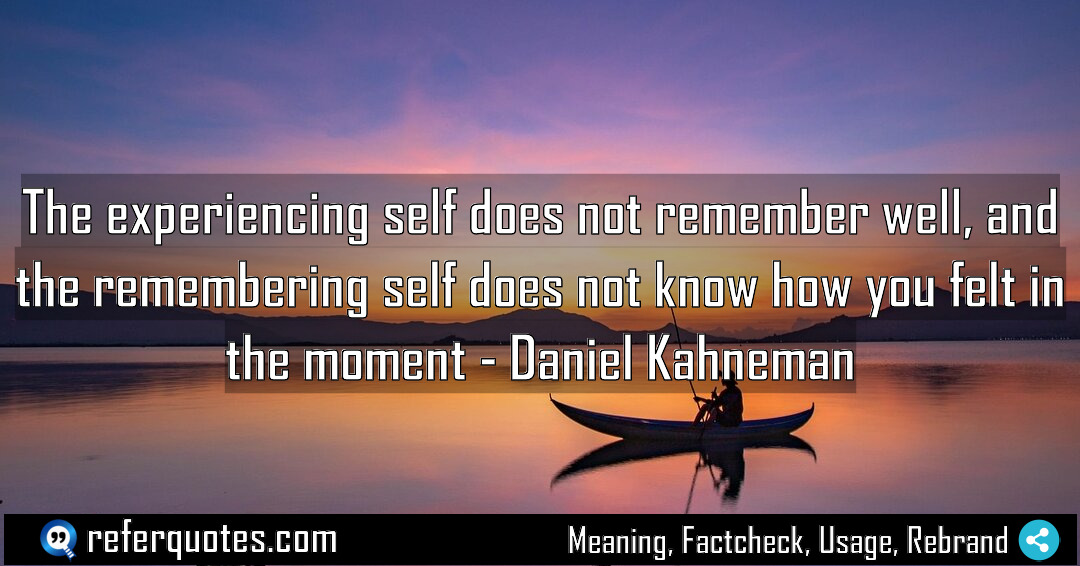You know that feeling when you’re on a tough hike, miserable in the moment, but you look back and think, “That was amazing!”? That’s the core of Kahneman’s brilliant insight. The experiencing self does not remember well, and the remembering self takes over, often rewriting the story. It’s a fundamental disconnect that shapes our decisions and our lives more than we realize.
Share Image Quote:Table of Contents
Meaning
It means we have two different “selves” inside us: one that lives through an experience moment-by-moment, and another that later tells the story of that experience. And they often disagree completely.
Explanation
Let me break this down because it’s a game-changer. Your experiencing self is you, right now, feeling the warmth of this coffee, hearing the background noise. It lives in a series of present moments. But it has a terrible memory; it doesn’t store every single second. Then there’s your remembering self. This is the narrator of your life. It doesn’t care about duration, it cares about peaks and endings. It takes a few key snapshots—the best part, the worst part, and the final moment—and weaves them into a story. That story is your memory. And that’s the self that makes most of your big decisions. It’s why you’ll choose to go back to a vacation spot where you were bored most of the time but had one incredible dinner at the end. The remembering self is in charge, and the experiencing self, the one that actually lived through the boredom, gets completely overruled.
Quote Summary
| Context | Attributes |
|---|---|
| Original Language | English (3668) |
| Category | Emotion (177) |
| Topics | experience (26), memory (50), self (15) |
| Literary Style | philosophical (434) |
| Emotion / Mood | provocative (175) |
| Overall Quote Score | 83 (302) |
Origin & Factcheck
This concept comes straight from Daniel Kahneman’s 2011 masterpiece, Thinking, Fast and Slow. It’s based on his Nobel-prize winning research. You sometimes see this idea pop up in pop psychology without attribution, but it’s pure Kahneman, rooted in decades of rigorous study in behavioral economics.
Attribution Summary
| Context | Attributes |
|---|---|
| Author | Daniel Kahneman (54) |
| Source Type | Book (4032) |
| Source/Book Name | Thinking, Fast and Slow (54) |
| Origin Timeperiod | 21st Century (1892) |
| Original Language | English (3668) |
| Authenticity | Verified (4032) |
Author Bio
Dr Daniel Kahneman transformed how we think about thinking. Trained in Israel and at UC Berkeley, he built a career spanning Hebrew University, UBC, UC Berkeley, and Princeton. His partnership with Amos Tversky produced prospect theory and the heuristics-and-biases program, culminating in the Nobel Prize in Economic Sciences. He engaged broad audiences through bestselling books and practical frameworks for better decisions. He continued writing and advising late into life, leaving ideas that shape economics, policy, medicine, and management. If you want to dive deeper, start with the Dr Daniel Kahneman book list and explore his enduring insights.
| Official Website
Where is this quotation located?
| Quotation | The experiencing self does not remember well, and the remembering self does not know how you felt in the moment |
| Book Details | Publication Year: 2011; ISBN: 9780374275631; Latest Edition: Farrar, Straus and Giroux, 2013; Number of pages: 499. |
| Where is it? | Part IV: Choices, Chapter 35: Two Selves, Approximate page 382 (2013 edition) |
